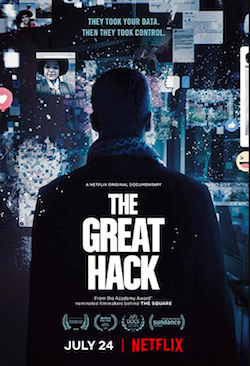 The Great Hack has just dropped on Netflix (IMDB | Rotten Tomatoes | wikipedia | poster left). It is a documentary that explores “how a data company named Cambridge Analytica came to symbolize the dark side of social media in the wake of the 2016 US presidential election”. Much has already been written about the Cambridge Analytica scandal (eg ICO here and here (pdfs) | Carole Cadwalladr in The Guardian), and a great deal more will be written as the movie is reviewed in the coming days. I don’t propose to add to those torrents here. Rather, I simply want to observe that there is a word for a company that symbolizes the dark side of social media.
The Great Hack has just dropped on Netflix (IMDB | Rotten Tomatoes | wikipedia | poster left). It is a documentary that explores “how a data company named Cambridge Analytica came to symbolize the dark side of social media in the wake of the 2016 US presidential election”. Much has already been written about the Cambridge Analytica scandal (eg ICO here and here (pdfs) | Carole Cadwalladr in The Guardian), and a great deal more will be written as the movie is reviewed in the coming days. I don’t propose to add to those torrents here. Rather, I simply want to observe that there is a word for a company that symbolizes the dark side of social media.
Reacting to Thomas More’s coinage of “utopia” as the “perfect state”, from the Greek “eu” meaning “good”, and “topos” meaning “place”, John Stuart Mill coined “dystopia” as the “frightening state”, from the Greek “dys” meaning “bad”, and (again) “topos” meaning “place”. But, whilst “dystopia” is perfect to describe a “frightening state” and its frightened society, it is not particularly apt to describe a “frightening company” and its frightened society. Indeed, we don’t really have the words for when a corporate society goes bad; “dystopia” and “dystopian” have been pressed into service (even in the context of reviewing The Great Hack: “Watching this film, you literally start to wonder if history has been warped towards a sickening dystopia”); but the warped society in that movie is very different to the warped society in classic dystopian fiction (such as, to take the obvious example, Orwell’s 1984). We can’t easily discuss a phenomenon until we have the proper words to describe it. As a consequence, in a world of surveillance capitalism where big data companies battle to collect our data and control the world, I think we urgently need to devise appropriate terms for frightening companies and frightened societies. One way to do so is to follow the lead provided by More and Mill. Let’s keep Mill’s “dys” as the prefix, and look for a suitable Greek word, analogous to “topos”, to which to add it. “Aguris”, which means “crowd” or “group” (or “gathering”, “assembly” or “marketplace”, and which has already lent other words to modern English). Hence, from “dys” meaning “bad”, and “aguris” meaning “crowd” or “group”, I suggest “dysaguria”, as a noun meaning “frightening company”, and “dysagurian” as the adjective to describe that company and its frightened society.
Indeed, “dysaguria” is the perfect noun and “dysagurian” is the perfect adjective to describe the eponymous company in Dave Eggers’ The Circle, Gryzzl on Parks and Recreation, and Centillion in Ken Liu’s short story “The Perfect Match”. They are also the perfect words to describe the world exemplified by Cambridge Analytica. If we are not living in a frightening present, then we are certainly facing a frightening future, in which frightening companies frighten society; and the words to describe this are not “dysatopia” and “dystopian” but “dysaguria” and “dysagurian”.
In a word, no. More meant “ou-topia”, in other words “no place”, or “doesn’t really exist”. It was only later commentators who assumed he meant “eu-topia”, good place. Which is wrong because (1) “ou” and “eu” were different sounds in classical Greek and weren’t pronounced anything like the same so far as we can tell, and anyway (2) “eu” and “dys” are adverbs, not adjectives – “eu-topia” would have meant “well-place”, which doesn’t really mean anything unless we can infer the verb that “eu” is supposed to be modifying (“well-remembered place”? “well-painted place”? “well-loathed place”?). “Good place” would have been kalotopia, “best place” aristotopia, “bad place” kakotopia. And while I don’t have my big dictionary to hand, I’m pretty sure “aguris” doesn’t mean “crowd” – usual words for crowds would have been plethos, ochlos or (for one specialised but rather important sort of crowd) demos. Are you sure this isn’t a confusion with “agora” (which is the obvious place for a crowd to gather)?
Thanks, Steve. I’m happy to follow Mill for “dys”, even if the route to it stems from a confusion about “eu” versus “ou”. As for “aguria” versus “agora”, does this help? It is the source I relied on in my first post on the topic. In the end, I’m not so wedded to the particular word as to the more general point that we need words to describe frightening companies and societies frightened by them.